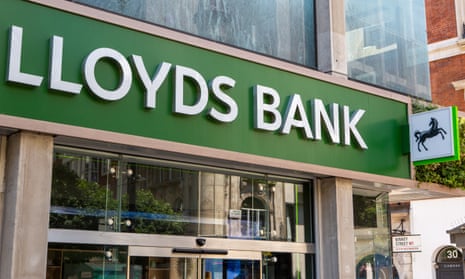
Lloyds shareholders could take £1bn hit over car finance crisis
Analysts forecast bank will have to halve £2bn buyback plan, as ex-boss of City regulator blames watchdog for crisis
Lloyds Banking Group could give almost £1bn less to shareholders this year as a result of the car finance crisis, analysts have said, as the City regulator’s former boss blamed the watchdog for the chaos.
The estimated size of a multibillion-pound compensation bill for motor lenders has grown after a shock court of appeal ruling last Friday, which said customers could not consent to motor loans that involved “secret commission” payments to brokers and car dealerships.
It means Lloyds could now be left to cover a compensation bill of £3.2bn, according to RBC Capital, which has raised its estimates from £2.5bn. It said the figure could hit £3.9bn in the worst-case scenario.
The mounting costs are now expected to hit shareholders, with Lloyds expected to cut its £2bn share buyback programme in half. RBC analysts only expect £1bn to be returned to investors.
Lloyds announced the share buyback in February, when the bank was flying high from a 57% jump in annual profits to £7.5bn. At the time, the bank had only put aside £450m to cover potential payouts linked to an Financial Conduct Authority (FCA) investigation into a very specific type of commission payment – known as discretionary commission arrangements – that was banned in 2021.
The new judgment, which goes beyond the scope of the FCA investigation, has also prompted Lloyds to scrap all commission payments across its £15bn Black Horse car division.
Lloyds shares have tumbled more than 13% since Friday.
RBC has also increased its forecasts for other lenders, with Santander UK now expected to pay £1.4bn (up from £1.1bn), Barclays £400m (up from £360m) and Close Brothers £320m (up from previous estimates of £250m).
Meanwhile, Sir Howard Davies, the former chair of NatWest and the FCA’s precursor, the Financial Services Authority, hit out at the watchdog for failing to get a grip on the growing crisis, which has left lenders scrambling to understand the implications of the ruling.
Speaking to a House of Lords committee on Wednesday, Davies said the lack of clear rules from the FCA had created a vacuum of interpretation for the court of appeal. He said it had “caused a lot of anxiety and caused significant share price moves”.
after newsletter promotion
He said: “I’m disappointed that there has not been sufficient regulatory clarity on the rulebook. That has meant that the court has been able to step in with its own interpretation.
“My general experience in this area … is that if a regulator is very clear about the expectations on firms, then the courts are usually reluctant to substitute their judgment for that of the regulators within a statutory context … the courts normally back off.”
Shares in Close Brothers – which was a defendant in the case and plans to appeal against it in the supreme court – have tumbled more than 37% since Friday, when it halted lending. Santander UK also delayed the release of its quarterly results at the last minute on Tuesday, while it reviewed the judgment.
Lloyds declined to comment beyond a statement published on Monday, which said: “The group is assessing the potential impact of the decisions, as well as any broader implications, pending the outcome of the appeal applications. The group will update the market, if and as appropriate.”